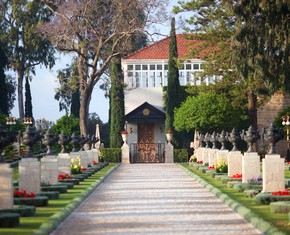The views expressed in our content reflect individual perspectives and do not represent the authoritative views of the Baha'i Faith.
Like the birth of all of the founders of the world’s great religions, Baha’u’llah’s physical birth seemed normal and unremarkable – at first.
His father, Mirza Buzurg, a nobleman and a minister to the court of the Shah of Persia, came from one of Persia’s most ancient and best-known families. It was expected that Baha’u’llah would follow in his father’s footsteps. But as Baha’u’llah grew to manhood, something within him awakened and called him with such intensity that he cast aside the comfort and safety of his family and his home to pursue another path – a spiritual course that led him to forty years of imprisonment as the founder of a new worldwide Faith.
Baha’u’llah gave us his own description of this phenomenon in a letter he addressed to the Shah of Persia from prison:
O King! I was but a man like others … when lo, the breezes of the All-Glorious were wafted over Me, and taught Me the knowledge of all that hath been. This thing is not from Me, but from One Who is Almighty and All-Knowing. And He bade Me lift up My voice between earth and heaven, and for this there befell Me what hath caused the tears of every man of understanding to flow.
The learning current amongst men I studied not; their schools I entered not. Ask of the city wherein I dwelt, that thou mayest be well assured that I am not of them who speak falsely. This is but a leaf which the winds of the will of thy Lord, the Almighty, the All-Praised, have stirred. Can it be still when the tempestuous winds are blowing? Nay, by Him Who is the Lord of all Names and Attributes!
… The evanescent is as nothing before Him Who is the Ever-Abiding. His all-compelling summons hath reached Me, and caused Me to speak His praise amidst all people. I was indeed as one dead when His behest was uttered. The hand of the will of thy Lord, the Compassionate, the Merciful, transformed Me.
RELATED: In Their Wake: Women Walking a Spiritual Path
The men imprisoned with Baha’u’llah were the first to catch the spark of his newly ignited Faith. Baha’u’llah taught the men to chant two verses, in a call-and-response manner as they sat facing each other in the dank darkness of the Black Pit: “God is sufficient unto me; He verily is the All-Sufficing!” chanted one row. The other responded, “In Him let the trusting trust ….”
This experience transformed them. When Baha’u’llah first entered the Black Pit, nothing could be heard but cries of despair and pain, the rattling of chains, and the scurrying of rats. Now the chanting of the men praising God could be heard well beyond the prison grounds.
The Shah, in his nearby palace, heard their singing. One day, in an absurdly hypocritical gesture, he sent a tray of roast lamb to Baha’u’llah and the men in the dungeon. We can only imagine how enticing the sight and smell of the food was to the starving men. All the men turned to Baha’u’llah to see what his reaction would be. Baha’u’llah returned the tray to the Shah untouched, and the men resumed their singing.
Its unimaginably harsh conditions made the Black Pit infamous as the world’s worst prison. There the guards went beyond physical torture, to apply cruel psychological tactics in their attempts to break the resolve of the Babi prisoners. On one occasion the guards selected a Babi for execution, took him away and then brought him back, stating that this one was too skinny to execute. They exchanged him for another man and led him to his execution.
No matter what happened, though, the new spirit of the prison that Baha’u’llah brought could not be broken. Each day, the guards entered and called out the name of one Babi. That one would first embrace Baha’u’llah, and then follow the guards to the place of his execution.
For the followers of Baha’u’llah, life is sacred because all of creation reflects the beauty of the Creator. And yet when death comes, it is viewed as a doorway to reunion with God. As Baha’u’llah taught: “I have made death a messenger of joy to thee. Wherefore dost thou grieve? I made the light to shed on thee its splendor. Why dost thou veil thyself therefrom?”
RELATED: America’s Black Newspaper and the Baha’i Faith
After Baha’u’llah’s reassurances, the prisoners no longer feared death, and understood that their new faith could not be broken by it. But Baha’u’llah’s wife and children also understood the danger he faced while in prison. Each morning brought with it the execution of one more innocent Babi. With each passing day, they wondered if Baha’u’llah would survive to the next.
However, after four months in the heinous, horrible conditions of the Black Pit, Baha’u’llah and the surviving Babi prisoners would face a new threat: exile.
















Comments
Sign in or create an account
Continue with Googleor